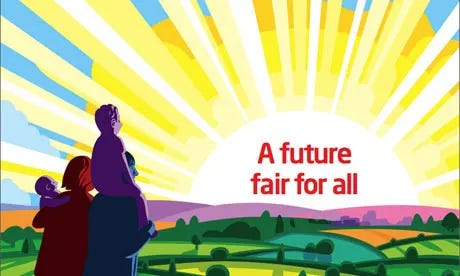That vision thing
Political vision is a slippery concept - all too often defined by its lack. So what is it, how do you demonstrate it and why does it matter?
In my professional life, I am really privileged to work with movements around the world helping with their strategic planning and theory of change work. I speak to activists at a range of levels from those working at the hyper-local level to those working nationally (in a variety of nations - so far this year I have worked with organisations in Sweden, The USA and Zambia as well as here in the UK).
In the feedback I get I feel I am doing good - helping these organisations to develop and grow and - more importantly - hone their mission to achieve their vision.
But I get a lot out of this work too. Working with activist movements across the globe I am able to build a bigger picture of trends in and around activism that are helpful insights even as I help them with their own insights. I understand the pressures they are under, but also the particular confluence between those pressures and their skills, knowledge and experience.
When I work with people on their campaigning, what I try to do is help them to lift their eyes from the day-to-day so they can see the bigger picture. So we usually start with looking at both their mission and more importantly (to this piece) their vision.
What is really clear about campaigners is that they are ‘verb people’. Campaigners want to do do do. Take action, do something. Do it now, do it yesterday before it’s too late. Campaigners don’t like to stop the doing to think about the why they are doing because it means that while they are thinking there is doing not being done.
Campaigners and activists are also motivated to activate others to do. But usually this only happens in calls to action that motivate other ‘verb people’. People who want to be given a task to complete and feel good about rather than a story that will fire their imaginations but not specifically direct their actions. ‘Noun people’ are not touched by verbs and ‘verb people’ are not always good with nouns.
But the world is better when we look at it in different ways. And part of my job working with the organisations is to help them to realise their goals that have to be described to their key audiences. They are often quite good at this when it comes to the mission - the ‘we will’ is all still about action yet to be taken. Where many campaigners struggle is in describing what a world in which they have won will look like; how it will feel; what the lives of the citizens they have worked tirelessly for will be like once the battle is over.
This desire for action and doing makes it really hard for many activists - be they in civil society or politics - to set out a vision. But it is essential that they do.
In part for them - thinking not just about the striving but what they are striving towards helps with self care and also organisational hygiene. If we know what the world looks like when we achieve our aims, we probably also know when and if we should either put ourselves out of business or openly pivot to either a new campaign or a sense of guardianship - protecting the world we have made. If we are forever striving and never achieving everyone will achieve burnout sooner or later.
But more importantly than those internal reasons vision is essential for external audiences. For funders or voters or communities or a populace whose support you seek. They need to know not what that support will mean in actions you will take, but in concrete results they will feel.
So it is encumbant on those who want support - particularly in politics to get past the verbs and into some serious nouns and even adjectives. A politician - especially one asking for our votes to be leader of our country need to tell us not just what they will do (the policy) and not just why they will do it (the evidence and the ideology) but also give us a sense of what that will mean for how we live our everyday lives. They must be able to describe those lives in ways that will connect to the what and why of politics but also paint a visceral picture of a real and different path for the country they are vying for.
Difference is vital here. But being not something is not the answer. And this is where Keir Starmer and Labour come in.
Starmer’s Labour are often accused of having no policies or no vision. The former isn’t true but the reason it is easily and widely believed is because at the moment the latter really is. And that’s a problem. I don’t have a sense of what the county will be like a year after Starmer is elected, or five years, or a decade.
Starmer has spent his time in leadership telling us largely what he isn’t. He isn’t Jeremy Corbyn. He isn’t Boris Johnson. Not being either of these is a pretty good start at running for election. But it is not a vision and it is not enough. It is not anything like enough.
A vision has to be personal to the speaker but available to the wider listenership. It cannot simply be bland platitudes that anyone could spout, but must link back inexorably to the policy journey of the individual and the values that are unique to them and their party.
So talk about Labour’s biggest policy by far - the £28 billion a year promised on fighting climate change. For climate campaigners that sounds like a good start. For many of the rest of us though it is unclear what that will mean to our lives. So tell us.
Don’t give us investment statistics and targets for factories.
Talk about the feeling of satisfaction a heavy industry worker can feel when she goes home from a newly build green factory, knowing her hard day’s graft will have built a better future for her grandkids. Never having to feel like you are compromise their future in your need for good work. Ending that dillema of the heart.
Talk about how the changes in industries targeted by a government unafraid to ‘pick winners’ will look like in your town, on your hight street, in your community services. Making our places once again the heart of an industry not a place you have to flee to get work. Talk about the difference local jobs make to families and the repair we will do to the social fabric of our lives by investing in value at home - not just extracting it into an amorpheous and ever distant corporate world.
Talk about the good state and the humanity that comes with a helping hand that expects us to not only give what we can but helps us all to be who we can. Talk about what that needs to those of us who have needed temporary help from the state. Tell the stories of those who will always rely on public services. Link us back together by sketching out the street that we live on - streets in villages and cities of the Noth, South East and West - London, Manchester, Birmingham, Nothern Ireland, Wales and Scotland. Talk about that sense of community that was the best of how we all felt during the pandemic. Talk about how Labour policies are about capturing the best of that everyday.
Tell a story of a future that is uniquely Labour. Talk about your policies and ideology and motives and background. But use all of that not to talk about yourself but to paint a vivid and bright future that the people of the UK can feel and understand. One that is different from what any Tory could ever offer because they simply don’t have the faith in the policies or the people of Britain that a Labour government will.
Labour has so many of the right elements of a successful vision. But it is living in fear of defining it. But they must. As they say in Strictly Ballroom, a life lived in fear is a life half lived.
Unless Labour pins its policy colours to the mast of a clear and defined future it will be doomed to forever live the half life of an opposition party. That should be the only thing that truly scares Starmer.
It scares the pants off me.
I run a political and communications consultancy called Political Human. Please get in touch if you are looking for political or media consultancy advice, strategic communication and campaign planning, ghostwriting, copywriting, editing, training or coaching.
You can read some lovely things that some of my clients have said here.
What I’ve been up to
Some of you will have seen that we released an album of the songs from my first play. Work continues apace on re-staging Triggered even as I am writing the third play. So the mid-life crisis clearly continues!
I was quoted here talking about why Mick Lynch is so good at communicating and has run rings around so many journalists.
I was also quoted here talking about why 40 or even 50 year mortgages are both a mad idea and will not give the Tories the Thatcherite RTB-style boost they think it will.
I saw Tomorrow Night Live at the Seven Dials, which had most definite potential even if it tried to have it both ways a little too crudely.
I saw some extraordinary physical theatre in the intriguing and illuminating Dog/Actor at the Etc Theatre as part of the Camden Fringe.
Finally I saw All of Us at the National Theatre which was powerful, but occasionally undermined that power in its need to shout its politics rather than let us come to our (obvious) agreement with it.
If you would like to invite me to see your show get in touch by reply or through the email below.
A final appeal. This newsletter takes quite a while to think about and write. I know things are really tough all over at the moment, but if you can spare some cash to say you’ve appreciated it, I can’t tell you how much that would mean to me right now.
Questions, comments and arguments are very welcome. Insults will get you summarily blocked on every platform that no longer hosts Donald Trump. I’m at emmaburnell@gmail.com or on Twitter (far too often) at @EmmaBurnell_.





